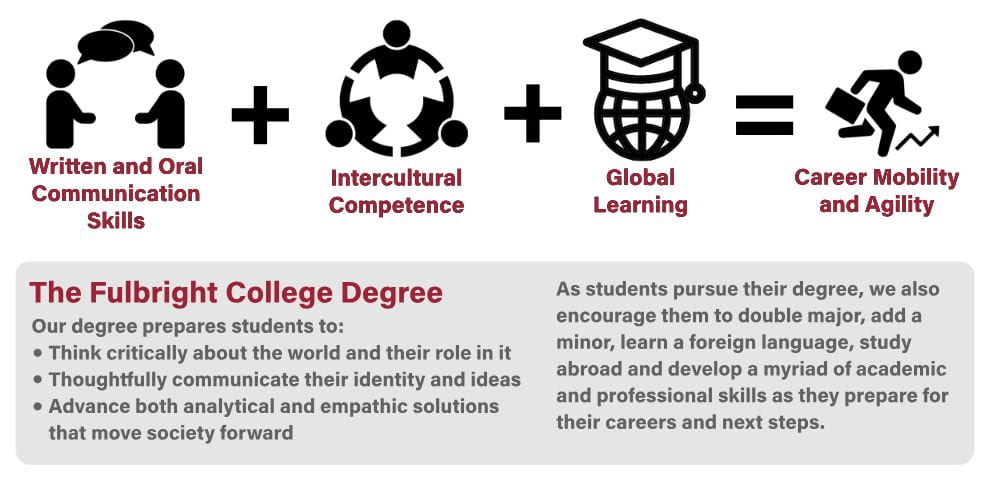Internships: Get a Jump Start on Creating a Successful Career Story

Former Department of Communications students enjoying an internship.
Editor’s Note: This story is part of our series highlighting the importance of internships, and the incredible positive impact they can make for our Fulbright College students. Stay tuned for more soon! In the meantime, you can also explore our Career Connections resources, for information about internships and so much more.
The breadth, depth, and diversity of the coursework students take to earn degrees in the Fulbright College of Arts and Sciences creates a unique and valuable set of crucial career skills.
However, it can also create challenges for students – who are still actively writing their career stories while seeking their degrees. And, for employers – who may not have a thorough knowledge of the content of the degree programs in the college, or the valuable skills our students graduate with.
Additionally, while an architecture, nursing, or engineering major typically follows a linear career path from degree to career, Fulbright College majors often take the skills they developed in the classroom in unexpected and diverse directions.
For example, the critical thinking, communications, writing, research, and creative problem-solving skills an English, history, or philosophy major learns can translate well into careers ranging from being a lawyer, to social media and communications specialists, to business managers, to fundraisers and directors of non-profit organizations, and so many more possibilities.
Completing an internship can be a key piece in the puzzle of discovering and then writing about and telling one’s unique career story to potential and future employers.
Here are four reasons why Fulbright College majors benefit from building an internship into their academic plans.
 Develop and demonstrate your power skills.
Develop and demonstrate your power skills.
The National Association of Colleges and Employers (NACE) surveys employers annually to find out the top skills they seek in recent college grads.
Year after year, the skills they identify are those developed in Fulbright College classrooms, including communication, critical thinking, global learning, and intercultural competence. This is true across all industries.
Presentations, papers, class discussions, and research develop those skills in the classroom and an internship helps students then apply those skills in a professional setting. Internships give students a space to leverage their skills and perspectives to solve real-world problems, contribute to projects, and make meaningful impacts within organizations.
Additionally, attaching these skills to a specific project or work experience on your resume or in an interview helps future employers understand your value. Anyone can write “great communicator” on a resume but providing proof makes a much more compelling argument.
 The combination of crucial skills discussed above leads to career mobility and agility.
The combination of crucial skills discussed above leads to career mobility and agility.
Graduates are not tied to a single, narrow career path that can be derailed by shifts in technology or the economy.
It is impossible to predict how much these areas will shift over the next 40+ years so the best preparation is to develop adaptability and a willingness to embrace change – key features of a degree from Fulbright College.
According to JP Michel, author of “The World Needs You: a new mindset for student career exploration,” there are currently over 20,000 job titles out there and agile Fulbright College grads are prepared well for a lot of them!
 Having so many options can be exhilarating, but it can also be overwhelming.
Having so many options can be exhilarating, but it can also be overwhelming.
An internship is a low-stakes opportunity to try out a possible career field with little commitment. Internships have a defined end date, usually within 3-12 months, making it easy to pivot to explore something else later.
Sometimes the most useful experience is to try something out for six months and discover what you don’t want to do!
Alternatively, an internship can lead to a job offer or a second internship in a different area of an organization that you discover may suit you better.
 Internships are for everyone.
Internships are for everyone.
Fortunately, the days of the stereotypical unpaid intern, stuck making copies and coffee, are mostly gone. Internships should be and most often are paid.
NACE recently made a public statement on unpaid internships, calling for federal action to protect student workers. Unpaid internships limit access to experience to those who can afford to work for free and reproduce inequality. As NACE states, #UnpaidIsUnfair.
While some internships, especially those in the nonprofit sector, may still be unpaid, there are grants and scholarships available to help cover costs. Additionally, less traditional experiences, like externships, virtual internships, and intentional job-shadowing can offer experience to students already working full-time jobs and/or as caregivers.


